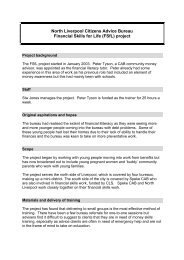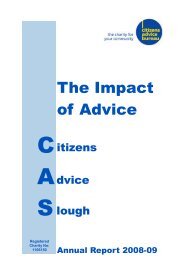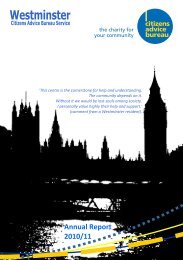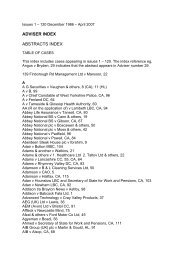Retaliatory eviction - Citizens Advice
Retaliatory eviction - Citizens Advice
Retaliatory eviction - Citizens Advice
You also want an ePaper? Increase the reach of your titles
YUMPU automatically turns print PDFs into web optimized ePapers that Google loves.
Shelter Cymru & <strong>Citizens</strong> <strong>Advice</strong> CymruAppendix: Examples of retaliatory <strong>eviction</strong> statutesNorth CarolinaDefense of retaliatory <strong>eviction</strong>, N.C. GEN. STAT § 42-37.1 (1979)(a) It is the public policy of the State of North Carolina to protect tenants and other persons whoseresidence in the household is explicitly or implicitly known to the landlord, who seek to exercise their rightsto decent, safe, and sanitary housing. Therefore, the following activities of such persons are protected bylaw:(1) A good faith complaint or request for repairs to the landlord, his employee, or his agent aboutconditions or defects in the premises that the landlord is obligated to repair under G.S. 42-42;(2) A good faith complaint to a government agency about a landlord's alleged violation of anyhealth or safety law, or any regulation, code, ordinance, or State or federal law that regulatespremises used for dwelling purposes;(3) A government authority's issuance of a formal complaint to a landlord concerning premisesrented by a tenant;(4) A good faith attempt to exercise, secure or enforce any rights existing under a valid lease orrental agreement or under State or federal law; or(5) A good faith attempt to organize, join, or become otherwise involved with, any organizationpromoting or enforcing tenants' rights.(b) In an action for summary ejectment pursuant to G.S. 42-26, a tenant may raise the affirmative defenseof retaliatory <strong>eviction</strong> and may present evidence that the landlord's action is substantially in response tothe occurrence within 12 months of the filing of such action of one or more of the protected acts describedin subsection (a) of this section.(c) Notwithstanding subsections (a) and (b) of this section, a landlord may prevail in an action for summaryejectment if:(1) The tenant breached the covenant to pay rent or any other substantial covenant of the lease forwhich the tenant may be evicted, and such breach is the reason for the <strong>eviction</strong>; or(2) In a case of a tenancy for a definite period of time where the tenant has no option to renew thelease, the tenant holds over after expiration of the term; or(3) The violation of G.S. 42-42 complained of was caused primarily by the willful or negligentconduct of the tenant, member of the tenant's household, or their guests or invitees; or(4) Compliance with the applicable building or housing code requires demolition or major alterationor remodeling that cannot be accomplished without completely displacing the tenant's household; or(5) The landlord seeks to recover possession on the basis of a good faith notice to quit thepremises, which notice was delivered prior to the occurrence of any of the activities protected bysubsections (a) and (b) of this section; or(6) The landlord seeks in good faith to recover possession at the end of the tenant's term for useas the landlord's own abode, to demolish or make major alterations or remodeling of the dwellingunit in a manner that requires the complete displacement of the tenant's household, or to terminatefor at least six months the use of the property as a rental dwelling unit.36


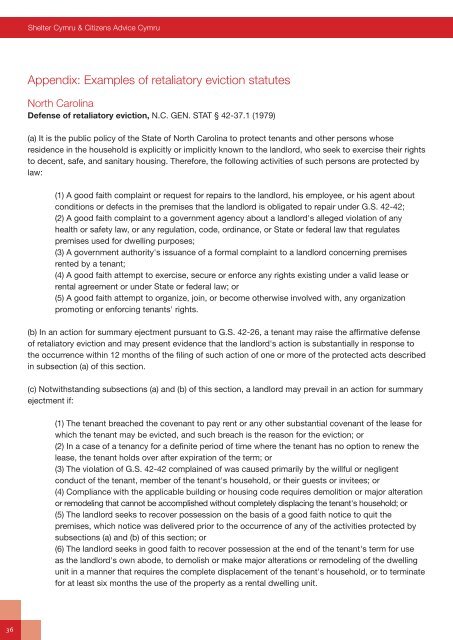

![Annual review [ 1.4 MB] - Citizens Advice](https://img.yumpu.com/50679529/1/190x135/annual-review-14-mb-citizens-advice.jpg?quality=85)

![Help for helping your residents [ 2.4 MB] - Citizens Advice](https://img.yumpu.com/48848542/1/185x260/help-for-helping-your-residents-24-mb-citizens-advice.jpg?quality=85)
